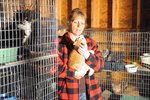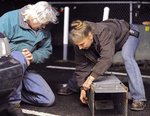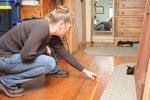



Last spring, standing in the parking lot of a local gas station, Twila Collins had a life-changing idea.
In a grassy field behind the station, she watched wild cats dart in and out of the tall grass. She recalled easily counting at least 20.
“I just had this moment of thinking, ‘This is wrong and this has to stop,’” Collins said.
Collins is director of The Cat’s Meow, the newest nonprofit in Lewis County aimed at reducing the number of uncontrolled and unwanted cats. Those already working with the problem say another helping hand is greatly appreciated.
“Our biggest problem right now is cats,” said Amy Hanson, director of the Lewis County Animal Shelter. “We’ve gotten so creative in what we can do for dogs in terms of foster homes and moving them to other shelters when we get too full but for some reason we just can’t do the same for cats. I think because it’s a problem everywhere.”
Of the approximately 3,000 animals brought to the Lewis County Animal Shelter each year, between 1,000 and 1,100 are euthanized. About 99 percent of those are cats, said Hanson. Friends of the Lewis County Animal Shelter, the nonprofit arm of the Lewis County Animal Shelter, has been working on founding a no-kill animal shelter in Lewis County but that facility has yet to be opened. And for some reason, this year has been ramping up to be one of the worst yet. Traditionally, kitten season hits hard around April with 15 to 20 new kittens brought to the shelter each day for at least a couple months. But this year has been different.
“Kitten season never really stopped this year,” Hanson said. “We still had some kittens at Christmas, which is really unusual. I don’t know if it’s the weather or what.”
Collins focus at The Cat’s Meow is reducing those unwanted kittens by focusing primarily on feral, or wild, cats. Since July 2009 she has been using non-lethal traps to capture them from areas where she knows there are large numbers of them. Every cat she catches is spayed or neutered and checked out by a veterinarian. Younger cats and those that can be tamed are kept by Collins at her home in Centralia, from which she tries to find suitable homes for them. A cat owner for 32 of her 40 years of life, Collins said she enjoys the visitors to her home while they are there.
“I can spend an hour out there just talking to them,” she said with a smile. “They’re so amazing.”
The rest of the cats Collins catches she calls “TNR” for trap, neuter (or spay) and release. Collins said while releasing the cats doesn’t help the feral cat population in the short term; it can make huge impacts in the long term since an unsprayed female cat can produce 400,000 cats in just seven years through her own offspring and their offspring.
“I’m not envisioning this becoming as big as the (Lewis County Animal Shelter) but I’m hoping it will be big enough to have a positive impact on the shelter by reducing its population,” Collins explained.
In the 20 years he has run Pet Connection, Ron Leventon of Chehalis said he has also seen a dramatic decrease in dog problems in Lewis County. The only exception would be pit bulls, for which FOLCAS recently began offering free spay and neuter services. Leventon’s nonprofit offers financial assistance on a sliding scale to those who want to have their animals spayed or neutered. He ventured the unwanted dog population has been cut by at least one-third since he’s been tracking it. But the number of cats continues to soar.
“That’s why Twila is such a blessing because she’s hitting the cat population where I couldn’t with the trapping,” Leventon said,
Both Leventon and Collins said they do what they do because they are animal lovers who do not want to see innocent animals abandoned or killed. But Collins said she’s even had some people who do not like animals donate to her cause when she explains the ultimate goal is to create a smaller population of animals that don’t all have a home. They’re starting their spay and neuter push right now in the hopes of stopping as many unwanted kittens as possible this April.
“I’m telling every caller, ‘If you don’t fix your cat right now you’re going to have unwanted kittens because this is the time of year they’re getting impregnated,’” Leventon said. “You need to stop the problem before you have a problem.”
Collins was going to college majoring in civil engineering but has recently changed her focus to business administration in the hopes she may someday be able to run The Cat’s Meow as a career. In just six months, she has been able to trap about 30 animals and find homes for about 15. She said she’s also worked at community events to spread the word about spay/neuter services that are available. She said she has also tried to reduce the feral cat population by warning people about the dangers of abandoning animals.
“It’s illegal and it’s immoral,” Collins said of what she tells people about dumping pets. “If they get caught they can get fined and sent to jail. I urge everyone I talk to to report dumping of animals if they see it.”
•••
Carrina Stanton is a freelance writer who lives in Centralia. She can be reached at carrinastanton@yahoo.com.